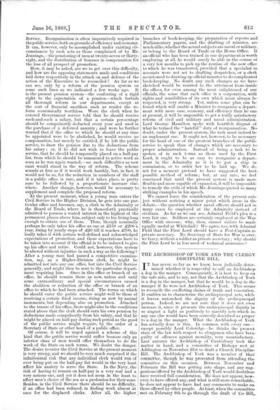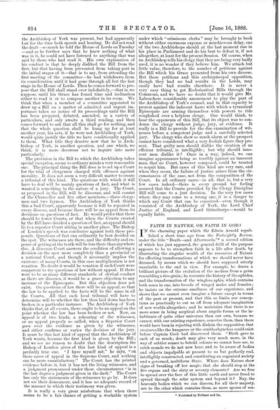THE ARCHBISHOP OF YORK AND THE CLERGY DISCIPLINE BILL.
TT has never, so far as we know, been judicially deter- mined whether it is respectful to call an Archbishop a dog in the manger. Consequently, it is best to keep on the safe side, and to say, not that the Archbishop of York is a dog in the manger, but that he would be a dog in the manger if he were not Archbishop of York. This seems- to reconcile the conflicting claims of truth and veneration_ It enables us to characterise the archiepiscopal acts, while it leaves untouched the dignity of the archiepiscopal person. Indeed, we are not sure that it does not even increase it, since it presents the archiepiscopal dignity in so august a light as positively to sanctify acts which in. any one else would have been correctly described as proper- to a dog in the manger. What the Archbishop of York has actually done is this. In common with every one— except possibly Lord Coleridge—he thinks the present state of the law with respect to clergymen who have been: guilty of offences against morality, very unsatisfactory. Last autumn the Archbishop of Canterbury took the- matter in hand, and a committee of Bishops met at. Addington on November 21st to draft a Church Discipline- Bill. The Archbishop of York was a member of that committee, though he was prevented from attending the. committee on this occasion. Between November and February the Bill was getting into shape, and any sug- gestions offered by the Archbishop of York would doubtless have received full consideration. He does not appear, how- ever, to have offered any, and what is still more remarkable,. he does not appear to have had any comments to make oft those offered by other people. At least, when the committee met on February 8th to go through the draft of the the Archbishop of York was present, but had apparently lost for the time both speech and hearing. He did not read the draft—so much he told the House of Lords on Tuesday —and as he further says that he knew nothing of what was in it, he could not have listened to anything that was said by those who had read it. His own explanation of his conduct is that he deeply disliked the Bill from the first, but that having been prevented from taking part in the initial stages of it—that is to say, from attending the first meeting of the committee—he had withdrawn from its consideration until it had gone through all but the last stage in the House of Lords. Then he comes forward to pro- pose that the Bill shall stand over indefinitely,—that is, we suppose, until his Grace has found time and inclination either to read it or to compose another in its room. We think that when a member of a committee appointed to draw up a Bill on a matter of admitted and urgent im- portance takes no notice of its proceedings until the Bill has been prepared, debated, amended, in a variety of particulars, and only awaits a third reading, and then conies forward to ask that all this shall go for nothing, and that the whole question shall be hung up for at least another year, his acts, if he were not Archbishop of York, would quite justify the title we have conditionally applied to them. What title they deserve now that he is Arch- bishop of York, is another question, and one which, we think, it is more decorous not to inquire into more particularly.
The provision in the Bill to which the Archbishop takes special exception, seems to ordinary minds a very reasonable one. The principal thing the Bill does is to set up a Court for the trial of clergymen charged with offences against morality. It does not seem a very difficult matter to create a tribunal of this kind. The questions with which it will have to deal will be mainly questions of fact, and what is wanted is something in the nature of a jury. The Court, as proposed in the Bill, will be diocesan, and will consist of the Chancellor and five other members,—three clergy- men and two laymen. The Archbishop of York thinks this a bad Court, apparently because it will be repeated in every diocese, and because there will be no appeal from its decisions on questions of fact. He would prefer that there should be fewer Courts, or that when the Courts created by the Bill have decided a question of fact, an appeal should lie to a superior Court sitting in another place. The Bishop of London's speech was conclusive against both these pro- posals. Questions of fact can ordinarily be best decided on the spot. The witnesses are there, and the difficulty and ex- pense of getting at the ti uth will be less there than anywhere else. A diocesan Court answers the condition of allowing a decision on the spot more completely than a provincial or a national Court, and though it necessarily implies the existence of many Courts, in this case multiplication is not vexation. No doubt it would be vexation if each Court were competent to try questions of law without appeal. If there were to be as many different standards of clerical conduct as there are dioceses, it would be a grave objection to any increase of the Episcopate. But this objection does not exist. On questions of law there will be an appeal, so that the law to be applied to the facts will be the same in all the Courts. All that each local tribunal will have to determine will be whether the law thus laid down has been broken in a particular instance. The Archbishop of York thinks that, at all events, there ought to be an appeal on the point whether the law has been broken or not. Now, an appeal is of two kinds, a rehearing of the witnesses, or an appeal properly so called, when a Superior Court goes over the evidence as given by the witnesses, and either confirms or varies the decision of the jury. It must be this last kind of appeal that the Archbishop of York wants, because the first kind is given by the Bill ; and we see no reason to doubt that the description the Bishop of London gives of this last kind of appeal is a perfectly true one. "I have myself sat," he gays, "on these cases of appeal in the Supreme Court, and nothing can be more unsatisfactory." The Court has the printed evidence before it, but it has not the living witnesses, and a judgment pronounced under these circumstances "is in the last degree a judgment given in the dark." The Court has only the statements of the witnesses to go by. It does not see their demeanour, and it has no adequate record of the manner in which their testimony was given.
It is really a very great misfortune that when there seems to be a fair chance of getting a workable system under which " criminous clerks" may be brought to book without either enormous expense or mischievous delay, one of the two Archbishops should at the last moment rise in his plate in Parliament and do his best to defeat it, if not altogether, at least for the present Session. Of course, when an Archbishop tells his clergy that they are being very badly used, it is no wonder if they believe him. We attach but little value, therefore, to the number of petitions against the Bill which his Grace presented from his own diocese. But these petitions and this archiepiscopal opposition, though they had no bad results in the Lords, may easily have bad results elsewhere. It is never a very easy thing to get Ecclesiastical Bills through the Commons, and we have no doubt that it would give Mr. Labouchere considerable amusement to play the part of the Archbishop of York's counsel, and in that capacity to protest against the indecent haste with which a tyrannical Episcopate are arming themselves with powers to ride roughshod over a helpless clergy. One would think, to hear the opponents of this Bill, that its object was to con- demn the clergy without judge, jury, or evidence. It really is a Bill to provide for the due examination of wit- nesses before a competent judge and a carefully selected jury. The clergy who show so much alarm at the prospect cannot have considered what a very foolish figure they pre- sent. That guilty men should dislike the creation of an efficient tribunal, is intelligible ; but why should inno- cent men dislike it ? Once in a way, indeed, we can imagine appearances being so terribly against an innocent man, that no Court, however composed, could be trusted to acquit him. But cases of this kind are very rare, and when they occur, the failure of justice arises from the cir- cumstances of the case, not from the composition of the Court. In all ordinary cases—in all, that is, but a very few cases indeed—there is every ground for feeling assured that the Courts provided by the Clergy Discipline Bill will come to a just decision. In the very few cases where they may come to a wrong one, it is a danger to which any Court that can be conceived—even though it consisted of the Archbishop of York, the Lord Chief Justice of England, and Lord Grimthorpe—would be equally liable.



































 Previous page
Previous page